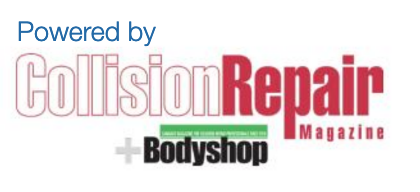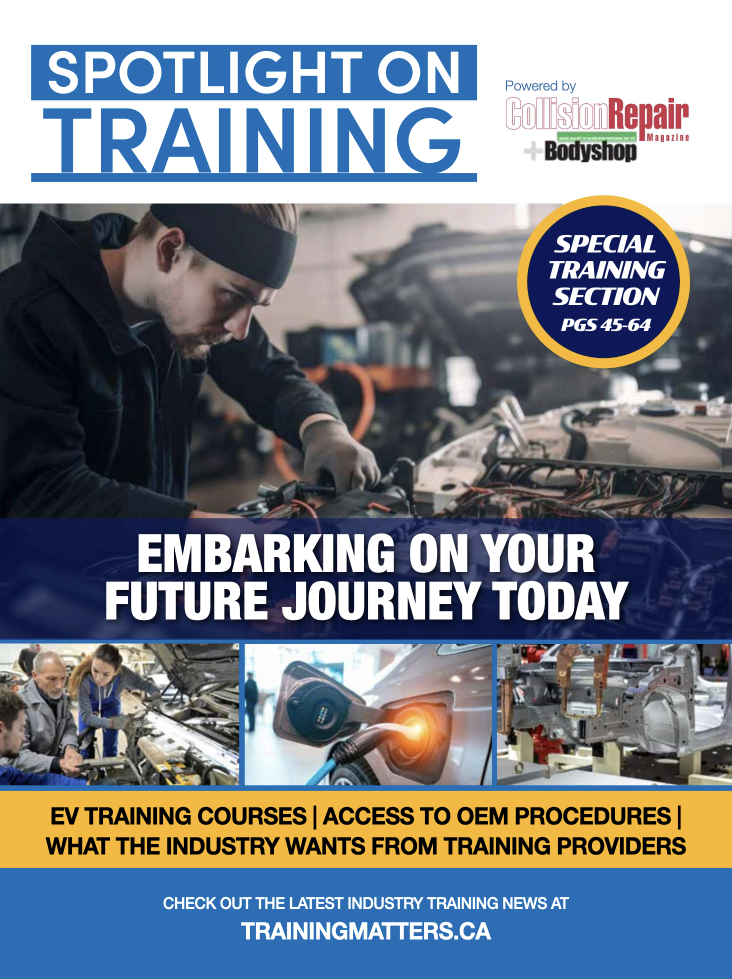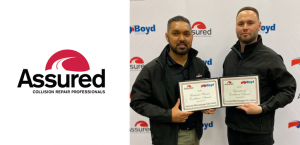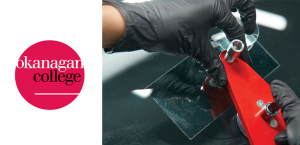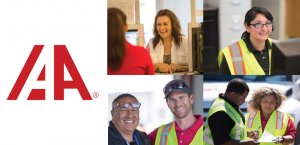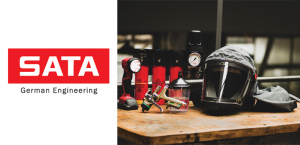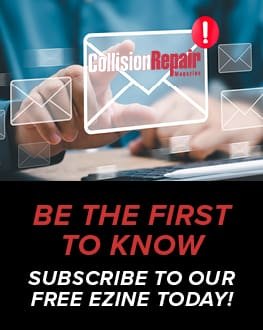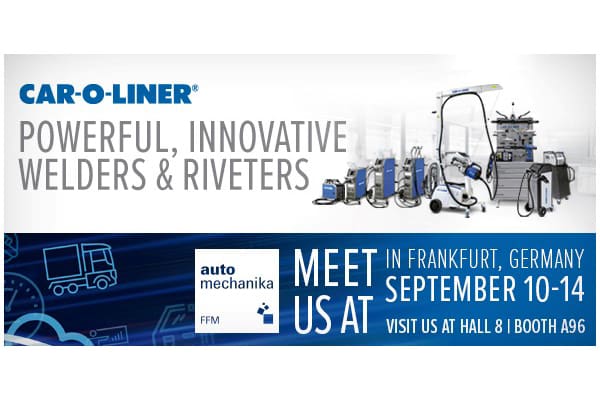THE FUTURE STARTS NOW
Explore the hundreds of listings in the Training Directory to find the course that is just right for you!
Unlock the Full Potential of Your Collision Repair Facility with CARSTAR

A category for all your needs!
The presence of Aluminum in vehicles continues to exist so it is still critically important for repair facilities to know the procedures that go along with it. Aluminum requires unique attention and adds complexity to the workflow of a repair facility. Everything from panel repair to damage assessment courses are covered in this section.
To be an apprentice a candidate must find an employer who is able to take them on as an apprentice and then make sure to register with their local apprenticeship or trades authority. Apprenticeship combines paid, work-based training (roughly 80 percent) with technical training in a classroom or shop (roughly 20 percent). The trades known nationally as autobody and collision technician, automotive refinishing technician and automotive service technician are all Red Seal trades. The Red Seal program allows qualified trades persons to practice in any province or territory in Canada where the trade is designated. Funding, programs and federal tax incentives are all available for employers so they can hire and train apprentices. Information about occupational standards and financial support for apprentices and businesses is available at red-seal.ca and canada.ca/en/employment-social-development/services/apprentices.html. This section lists organizations across Canada that offer apprenticeship training for auto body technician, automotive refinishing and automotive service trades.
In Canada Auto Body Technician, Automotive Refinish Technician are designated skilled trades and are regulated by provincial apprenticeship legislation. Apprenticeship training is a combination of paid, work-based training as well as short periods of technical training in a classroom or shop. To apprentice a candidate must find an employer who is willing to take them on as an apprentice and then register with their local apprenticeship or trades authority. Particularly, in the automotive trades, pre-apprenticeship training is offered by many colleges. These programs (often called core or foundation programs) make it easier for a candidate to find an employer willing to take them on as well as sometimes can count as a portion of the required apprenticeship training. Automotive service technicians provide repair and service to vehicle systems, including the engine, electrical/electronics, transmission, driveline, steering, suspension and brakes. Collision repair technicians restore damage to the exterior and the interior of motor vehicles. Automotive refinishing technicians paint and refinish automobiles either for collision restoration or custom paint jobs. This section lists organizations across Canada that offer core or foundation programs (pre-apprenticeship training) in the autobody, auto refinish and automotive service sectors.
Direct repair programs are programs offered by many companies and organizations and allow training directly at shop level online or at a designated training centre. This type of training is often also with a certification or I-Car accreditation and involves training about a company’s specific tools, equipment and service. These programs are run by knowledgeable instructors who often have many years of experience in the industry. This allows for training in a real world environment taking a more hands-on approach for a full understanding of a company’s equipment. This experience allows one to build confidence and experience that is often needed to stay ahead of the game diagnosing and repairing makes of automobiles. The following companies offer a wide variety of convenient, cost effective ways of training automotive professionals. Training programs are offered for almost every make and model of vehicle. All classes are 100% technical and delivered by experienced certified training specialists.
TO WORK IN CANADA YOU ARE REQUIRED TO HAVE BOTH HAZARDOUS MATERIALS (WHMIS) EDUCATION AND WORKSITE-SPECIFIC TRAINING. WHMIS is taught by a wide range of providers and includes information about things such as the meaning of information on labels and safety data sheets (SDSes, formerly MSDSes). Once this is complete, workers can get workplace specific training which allows them to learn how to work safely with hazardous products at a worksite. This training teaches employees to answer questions such as “how do you work safely with this hazardous product?” or “How do you deal with an unexpected exposure or spill?”. For information regarding WHMIS visit WHMIS.org. You can also see the Canadian Centre for Occupational Health and Safety at ccohs.ca for more general information. Automotive-specific safety training is often found through local associations. It is important to remain up-to-date on safety measures as new technologies often bring new hazards to a workplace. This section lists some industry-specific, safety-related courses available from I-CAR
To work in Canada you are required to have both hazardous materials (WHIMIS) education and worksite-specific training. WHMIS is taught by a wide range of providers and includes information about things such as the meaning of information on labels and safety data sheets (SDSes, formerly MSDSes). Once this is complete, workers can get workplace specific training which allows them to learn how to work safely with hazardous products at a worksite. This training teaches employees to answer questions such as “how do you work safely with this hazardous product?” or “How do you deal with an unexpected exposure or spill?”. For information regarding WHMIS visit WHMIS.org. You can also see the Canadian Centre for Occupational Health and Safety at ccohs.ca for more general information. Automotive-specific safety training is often found through local associations. It is important to remain up-to-date on safety measures as new technologies often bring new hazards to a workplace. This section lists some industry-specific, safety-related courses available from I-CAR
Technology develops rapidly which means the automotive recycling industry has to keep up with vehicles that are becoming more and more complex. The success of the professional recycler comes down to training to increase safety, efficiency and profitability as the industry expands. The training that is currently being offered covers a wide variety of programs and procedures, to governmental requirements, safety, sales, management, plant management and more. The benefits of the training include staying ahead of the game with environmental and regulatory compliance, industry skill, management, careers, and employee development. Many of the courses are offered online, thus allowing participants to train at their own pace.
Non-structural repair covers a vast variety of topics and encompasses many of the leading-edge technologies employed in modern vehicles. Driver-assist systems and telematics are areas that are constantly changing and that require technicians to continually update their knowledge. The assumption is that advancements in automotive technology will collect around the connected, autonomous, shaped, electric platform (CASE). The ‘Labour Market Watch’ report, published by the Automotive Industries Association, confirms that the automotive repair workforce is aging and much of the experience is pointed toward seasoned professionals. Listed in this section are a variety of courses that can help seasoned professionals and younger employees cope with new vehicle technologies.
The main areas for structural repair are computerized measuring systems, frame analysis and frame repair. Given the preponderance of high-strength steels and ultra-high-strength steels, identification of these advanced materials and knowledge of proper repair procedures is one concern. The efficient use of computerized measuring can maximize repair quality and profitability. In structural courses, you are provided with the opportunity to acquire the theoretical and practical knowledge and skills to ensure you have a competitive and leading edge in the field. Both online and hands-on courses related to structural repair are available.
As new materials make their way into vehicles it becomes imperative for technicians to update their knowledge of proper repair procedures. Spot welding, for example, is emerging as an essential technique for some vehicles. In addition to knowing how to use newer welding equipment, technicians may want to expand their knowledge of weld theory, metallurgy and testing. This section lists college-level welding programs, apprenticeship training and shorter, industry-led training opportunities related to welding. See also: the Aluminum section for courses specific to aluminum repair, including welding of aluminum, and the Structural section.
As the autobody and collision repair industry becomes more complex with new materials, technologies, techniques and environmentally friendly products and equipment it is important to stay up-to-date. Safe operating conditions and quality of appearance are both important things that body and paint technicians have to pay close attention to. Courses in the paint and refinish sector range from product training to improving paint centre productivity to colour theory. Refresher training as well as training to learn new techniques is available to collision centre operations and can improve efficiency as well as increase experience levels. Courses available to Canadians, from the industry’s major suppliers, are listed below.
By restoring a vehicle to its pre-accident condition and helping ensure its safety as designed by the manufacturer you are benefitting both your business and your customers. Nowadays it is not enough to simply know how to physically replace components you need to understand how they all work together. Pursing manufacturer-specific training can help you to meet the complex needs of repairing modern vehicles. Some vehicle manufacturers embed training requirements within the framework of a collision repair certification program, and then provide training only to certified facilities. More broadly-available, brand specific courses are listed below.
TRAINING DIRECTORY
Our goal with the our Annual Training Directory and trainingmatters.ca is to present a complete and comprehensive destination, which provides all automotive and collision repair training courses available to the industry nationally. Here you will find everything you need to know about collision repair/autobody courses offered through colleges, training centres, manufacturers, OEMs and more.
Training and certification are they key ingredients to staying ahead of the technology curve and enjoying a successful and sustainable career.
News
Featured Company Profiles
subscribe to the ezine
Keep up to date on everything going on in the automotive industry by subscribing to our e-zine!
